In a political era marked by increasingly sharp divisions and hyperpartisan debate, one refreshing exception to this trend has been the public’s softening stance on same-sex marriage. In 2001, 57 percent of Americans opposed same-sex marriage, according to the Pew Research Center. By last year, religious-freedom-related backlash notwithstanding, a majority – 62 percent – said they support allowing gay people to marry.
Going back nearly five decades to 1969, when the Stonewall riots erupted in New York City and spawned the gay rights movement, there were laws on the books across the country banning most homosexual activity, from cross-dressing to dancing with members of the same sex. Being outed as gay could destroy a person’s career.
Today, publicly identifying as gay or lesbian is a much more mainstream act. For some public figures, being open about their sexual orientation or gender identity is still a daring political statement. For others, it simply boils down to being open about who they are, as everyday as a heterosexual talking about her husband.
In this special section of City & State, we recognize 50 people in the LGBT community who are key players in the world of New York politics and government. Since we cover politicians on a day-to-day basis, we limited this list to those who are not strictly in government but instead influence it from the outside.
We partnered on this project with Benjamin Ryan, an editor at large at POZ magazine, where he covers the science of HIV. Ryan reached out to insiders and experts to compile this list, ranking each person based on their accomplishments, their sway in political and policy matters, their economic clout, their philanthropic efforts, their ties to powerful politicians and the constituencies they represent.
As New York celebrates LGBT Pride Month, we’re pleased to present the Pride Power 50.
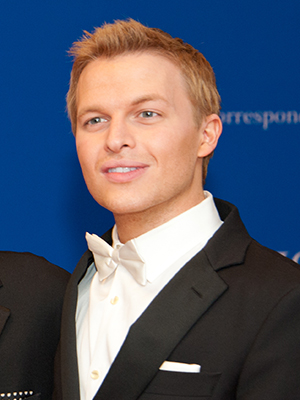
Contributing Writer, The New Yorker
“Be one with the target,” the actress and activist Mia Farrow once counseled her son Ronan. This motherly maxim was her map to professional higher ground: If in his work Farrow stayed focused on the goal, then he could weather the persecution and worry over personal ambition that may come with the territory. In pursuit of his goal of revealing the truth by giving a voice to the voiceless, this principled, tenacious and above all tireless – does he ever sleep? – newcomer to print media has sent shock waves through society. His exacting reporting on Harvey Weinstein’s horrifying alleged history of sexual harassment and assault secured the prestigious public service Pulitzer Prize for The New Yorker, along with The New York Times.
Only 30 years old, Farrow is a New York City native and onetime child prodigy who became the youngest graduate of Bard College at 15, earned a law degree from Yale Law School at 21 and then went on to assist the famed diplomat Richard Holbrooke in the Obama administration’s State Department.
Effective international relations work, as Farrow learned and recounts in his new best-selling tome, “War on Peace: The End of Diplomacy and the Decline of American Influence,” is slow, unglamorous work. As is long-form journalism, when conducted expertly. Now, in an age when the State Department and the media alike are under autocratic assault, Farrow has channeled his diplomatic savoir faire into investigative reporting. His articles, complemented by eloquent TV appearances, have helped upend traditional power structures, topple prominent bad actors, spawn the #MeToo movement and redeem the fourth estate as a pillar of democracy.
Farrow has also helped reaffirm New York City as a vital media capital while forcing the industry to confront its own abusers as well as its long-standing failure to take people like Weinstein to task.
Weinstein was, until a moment ago, a major New York City power player in the film and television industry as well as in theater, philanthropy and political fundraising. Not only did Farrow’s reporting help vaporize that influence and send the New York-based Weinstein Co. into bankruptcy, but the onetime MSNBC news program host’s first New Yorker article on Weinstein in October 2017 kick-started the recent criminal indictment against the once untouchable titan.
Farrow’s astonishing subsequent body of work in the magazine has also helped lift the curtain on the alleged shady use of sexual-transgression-related hush money and other associated murky financial transactions on the part of two other New Yorkers, President Donald Trump and his lawyer and fixer Michael Cohen. As if that weren’t enough, the reporter’s recent bombshell exposé on then-state Attorney General Eric Schneiderman’s alleged ritualistic psychological and physical abuse of women dropped a guillotine blade on the star politician’s career and kicked off a scramble among local politicians to replace him, potentially changing the identity of the new governor to be elected in 2022.
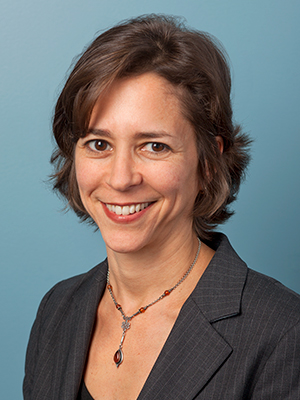
Principal and Co-founder, BerlinRosen
Thanks to her pivotal role in securing Bill de Blasio’s victory over Christine Quinn in the 2013 Democratic New York City mayoral primary, Valerie Berlin has cemented her place in the upper echelons of the New York City political power apparatus. This winsome principal at BerlinRosen, the public relations and strategic communications firm she co-founded in 2005, has held the mayor’s ear (not without controversy) throughout his tenure and aided his efforts to establish universal pre-K and the Vision Zero campaign.
BerlinRosen is an in-demand hub for political counsel in New York. Local private sector clients include those in labor, nonprofits and foundations, and the corporate world. The company teamed up with the Service Employees International Union to advance the Fight for $15 minimum wage campaign.
Berlin got her start as a staffer for the state Senate Democratic Conference under then-state Sen. David Paterson, and at the controversial community organizing group ACORN. She makes up half of a power couple through her marriage to Amy Rutkin, chief of staff to Rep. Jerrold Nadler.
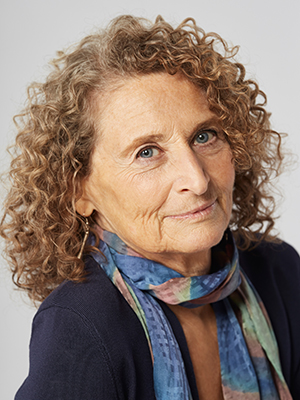
Executive Director, New York Civil Liberties Union
As executive director of the New York Civil Liberties Union since 2001, Donna Lieberman has been instrumental in pushing statewide criminal justice reforms. Successes under her watch include the deconstruction of excessive disciplinary policies at public schools that shape the so-called school-to-prison pipeline; reforms to broken windows policing and the reining in of stop-and-frisk abuses by the NYPD; and improvements to conditions and access to counsel for those incarcerated in New York state.
The Harvard University alumna, who received her legal training at Rutgers University, scored her most celebrated LGBT-related victory through her co-representation with Roberta Kaplan of Edie Windsor in the successful battle to strike down the Defense of Marriage Act through a 2013 U.S. Supreme Court ruling.
Lieberman’s office has also scored notable advancements on behalf of the rights of women (fighting for paid family leave and access to reproductive health care), immigrants (protecting access to public schooling for children of immigrants) and farmworkers (pushing for the right to organize) as well as affordable housing (buttressing racial fairness in New York City affordable housing).
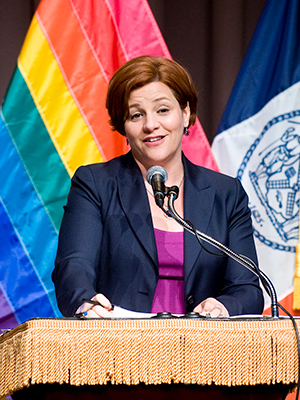
President and CEO, Win
The brash native New Yorker is down, but most certainly not out, and constantly spawning buzz about whether she will run for office again. Since losing her New York City mayoral run to Bill de Blasio, the former City Council speaker has taken the helm of Win, a local nonprofit that provides housing and supportive services to homeless women and their children. Christine Quinn is no stranger to nonprofit leadership, having served as executive director of the New York City Anti-Violence Project prior to her three terms in the council.
Quinn, who was arguably the victim of being quoted out of context after she quipped that gubernatorial candidate Cynthia Nixon was an “unqualified lesbian” (the “qualified lesbian” later apologized), has more than maintained her lefty bona fides and clout with the party brass in recent years as vice chairwoman of the state Democratic Committee, for one. She has also served as special adviser to Gov. Andrew Cuomo and has gone to bat for her longtime ally. She juices her visibility and fights the good fight through her work as a talking head on CNN.
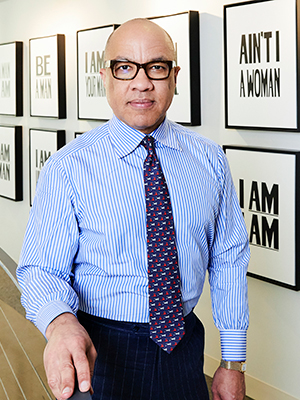
President, Ford Foundation
As president of the Ford Foundation, Darren Walker personifies influence. The $13 billion New York-based foundation grants about $600 million annually to advance human welfare worldwide. Born to a single mother in Louisiana, Walker got a boost from Head Start and later from Pell Grants. He began his career as a lawyer and investment banker before shifting to nonprofit work. As chief operating officer of the Harlem-based Abyssinian Development Corp., he worked to revitalize the neighborhood. He then leapfrogged to The Rockefeller Foundation and finally to Ford, ultimately assuming the presidency in 2013 – the same year he served on New York City Mayor Bill de Blasio’s transition advisory team.
To name a few of his extracurricular posts, Walker is on the Independent Commission on New York City Criminal Justice and Incarceration Reform, co-chairman of the Mayoral Advisory Commission on City Art, Monuments and Markers and a board member of Carnegie Hall and Friends of the High Line. Formerly, he served on the boards of the New York City Ballet and Jon Stryker’s LGBT-focused Arcus Foundation.
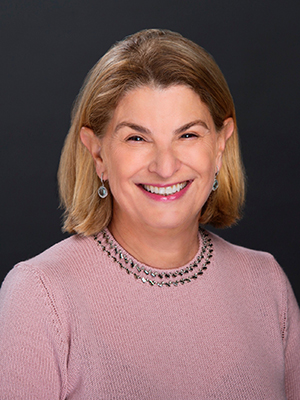
Executive Vice President of Corporate Affairs, Pfizer Inc.
An executive vice president at Pfizer Inc., Sally Susman is the chief lobbyist for the pharmaceutical giant, overseeing global communications and public affairs. Her duties include overseeing the company’s branding, governmental affairs, global policy and media relations. She also directs, or, rather, stiffens the resolve of the Viagra manufacturer’s political action committee and corporate responsibility group, and is vice chairwoman of the Pfizer Foundation, which promotes health care access as well as volunteer work among Pfizer's employees.
Susman got her feet wet in international trade work at the U.S. Department of Commerce during Bill Clinton’s administration – she was also a legislative assistant in the U.S. Senate from 1984 to 1990 – and then climbed the corporate ladder through vice president communications posts at American Express and Estée Lauder before landing at Pfizer in 2007.
The daughter of Louis Susman, a onetime investment banker and ambassador to the United Kingdom (a post once held by John F. Kennedy’s tycoon father, Joseph P. Kennedy) and major Democratic fundraiser, Sally was herself a top bundler for Barack Obama and Hillary Clinton.
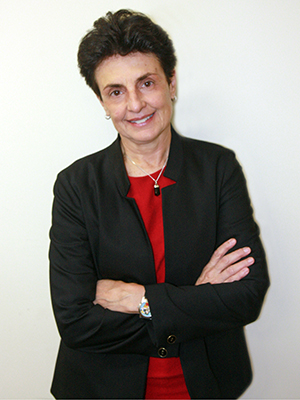
President and CEO, The New York Women’s Foundation
Since becoming president and CEO of The New York Women’s Foundation in 2006, Ana Oliveira has grown the nonprofit’s annual grant-making to support women and girls living in poverty from $1.7 million to $8 million in 2017. While maintaining her careerlong focus on incarceration, addiction and HIV, she has prompted the foundation to embrace a more expansive definition of gender and has invested more heavily in working with and on behalf of LGBT minorities.
The São Paulo native was previously executive director of Gay Men’s Health Crisis, a position that followed work at Samaritan Village and the Osborne Association.
Oliveira’s outside posts are extensive and include membership on New York City Mayor Bill de Blasio’s transition advisory team and the Independent Commission on New York City Criminal Justice and Incarceration Reform. She is also a commissioner for the New York City Commission on Human Rights, sits on the board of Philanthropy New York and was on the advisory boards of the Museum of the City of New York and the New York City Independent Budget Office.

President, American Federation of Teachers
As teacher walkouts gain important concessions or simply raise awareness in a number of school districts and as Betsy DeVos flexes her muscles as U.S. education secretary, Randi Weingarten’s role as president of the American Federation of Teachers, a union representing 1.7 million educators and staffers, has been central to a raging national conversation. The first openly gay person to lead a national labor union when she was elected in 2008, this passionate and outspoken leftist prepared for the role by serving for 12 years as president of AFT Local 2, which covers 200,000 educators in New York City public schools.
Weingarten has long kept LGBT issues as a part of the negotiating process on behalf of teachers at the city, state and federal levels, framing the effort as a matter of equality and fairness for all.
While AFT may be headquartered in Washington, D.C., Weingarten maintains strong ties to New York, where she shares a home with her new wife, influential Rabbi Sharon Kleinbaum. In recent years, she served on a state commission on education reform at Gov. Andrew Cuomo’s behest.
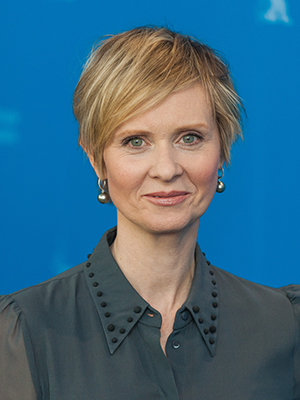
Gubernatorial candidate
There is no shortage of irony that those who decry a celebrity with no experience in government inhabiting the White House should support a TV star and political greenhorn for governor of New York.
That aside, one word encapsulates the reason why this Emmy, Grammy and Tony Award-winning actress turned gubernatorial candidate has rapidly amassed the political power others spend a lifetime cultivating: leverage. As a kind of progressive magnet, this longtime education and women’s health activist has unsettled Gov. Andrew Cuomo’s largely centrist politics and drawn him leftward as he seeks to avoid a bruising primary, his eyes ever fixed on 2020.
And so the curtain rises on the “Anything You Can Do, I Can Do Leftier” showstopping showdown. Cynthia Nixon visits the New York City Housing Authority? Cuomo declares a state of emergency at NYCHA and proposes a massive cash infusion. Nixon wants to legalize weed? Cuomo catches up with the high times. Nixon lambastes the Independent Democratic Conference? Cuomo brokers its dissolution. Further shifts by the governor include banning plastic bags and restoring voting rights to convicted felons.
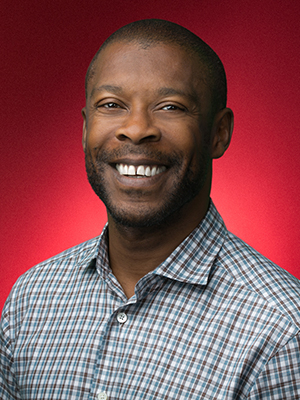
Director of External Affairs, Google New York
With Google’s recent $2.4 billion acquisition of the Chelsea Market building, the behemoth has firmly established itself as a major engine of Manhattan’s booming tech economy. This move has lent greater importance to William Floyd, who as director of external affairs for Google New York manages the company’s statewide policy and regulatory efforts as well as its public affairs and community relations.
A member of the New York City Economic Development Corp.’s board of directors, Floyd was behind Google’s recent $1 million donation to the Lesbian, Gay, Bisexual & Transgender Community Center toward expanding the Stonewall National Monument and other related efforts to mark the upcoming 50th anniversary of the 1969 uprising.
The Columbia University alumnus has a three-decade track record in government and community affairs at Verizon Communications Inc. and the New York Building Congress, and through various positions in city government, such as the 1989 New York City Charter Revision Commission.
Floyd sits on the boards of the Vera Institute of Justice and the Citizens Budget Commission, and is president of the board of the Children’s Museum of the Arts.
NEXT STORY: The 2018 Albany Power 100


